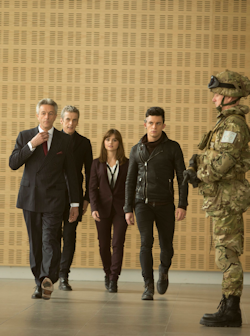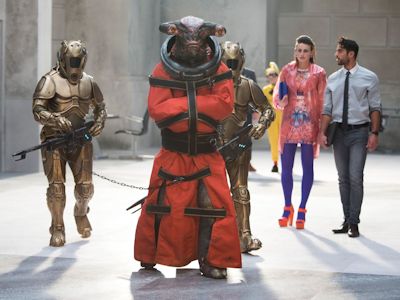Time Heist
Saturday, 20 September 2014 - Reviewed by

Time Heist
Written by Steve Thompson and Steven Moffat
Directed by Douglas Mackinnon
Premiere, 20 September 2014, BBC One
Once again events are set in motion by a telephone call made to the Doctor's Tardis. Clara is thinking of her next meeting with Danny, but a normal life with romance is not that simple for someone who assists the Doctor in his adventures.
A clever edit is made to a later point in time, with amnesia being deliberately chosen by the four bank robbers. All of this comes together to form a very snappy and enticing pre credits sequence. Steven Moffat knew this opening would be a cut above the average and has gone on record as saying as much. It would be a real shame were the casual viewer to miss the start time by five minutes and be left to wander what is going on a little too much.
The two 'extra' companions on this mission both are easily distinguished. Psi is a die-hard gamer with a somewhat shaky record in staying on the straight and narrow. Rather endearingly his half-computer status results in his voice being prone to switching to a robotic tone under stress. His record of theft plays into a big crescendo of decision making as the episode really clicks into top gear. And shape shifter Salibra has some back-story she'd rather keep to herself. Despite a kindly persona she is rather unsettling in being so conversant with assuming others' visual identities. All the same, her special ability is crucial in order for the Doctor's party to casually walk into the Bank with their express aim of pulling off the 'heist'.
Alien creatures stand out in this colourful instalments. Memory worms are an unsettling but actually benign 'cameo' monster, whose function is actually to introduce the conceit of a gang of four who must figure out why they are suddenly together. The main alien creature, the Teller is a more important new addition to Doctor Who's huge menagerie, and has something of a minotaur aspect to its design. Although in some ways this foe is similar to the entity from 'The God Complex' it is also very different at the same time. The sequence in which an apparently dodgy businessman pays a heavy price for his misdemeanours relating to the Bank is a very effective 'behind the sofa' sequence. Although little is known about this somewhat unfortunate victim the scene ends up being simultaneously dark satire and sheer horror. There is also an uttering by the Doctor of the word 'soup' which will stick in viewers' minds. Peter Capaldi certainly knows how to make the most mundane sounding sentences have an edge to them.
 The Teller's main role as a brain eater is sufficiently scary and memorable. However there is no question that the most malicious and cruel antagonist is villainess Miss Delphox - played by Keeley Hawes (Ashes to Ashes). We are even led to have sympathy for the monster, as it is harnessed to cause damage to enemies of the Bank, by being kept in either chains or in a form of cocoon. Furthermore Delphox manipulates the Teller to dispose of a nuisance individual or two and describes the action as 'account deleted' and generally struts about the Bank giving out orders in a nonchalant way. Evidently the Doctor will have to use his keenest wits to come up with a solution against such an antagonist.. except the finale has a twist where our Time Lord icon gets help from the most unlikely of sources.
The Teller's main role as a brain eater is sufficiently scary and memorable. However there is no question that the most malicious and cruel antagonist is villainess Miss Delphox - played by Keeley Hawes (Ashes to Ashes). We are even led to have sympathy for the monster, as it is harnessed to cause damage to enemies of the Bank, by being kept in either chains or in a form of cocoon. Furthermore Delphox manipulates the Teller to dispose of a nuisance individual or two and describes the action as 'account deleted' and generally struts about the Bank giving out orders in a nonchalant way. Evidently the Doctor will have to use his keenest wits to come up with a solution against such an antagonist.. except the finale has a twist where our Time Lord icon gets help from the most unlikely of sources.Given the title of the episode the actual 'Mission Impossible' material is given suitably sufficient screen time to build up, and then pays off in a fluid and engaging way. The uncertainty over the Architect's identity and whether he is someone to dislike is well done and the eventual twist over his motives is certainly one which may surprise the viewer; although I would imagine a certain number can perhaps be ahead of where Moffat and Thompson had imagined the general viewer to be.
The regulars are once again very enjoyable to watch. Capaldi is still growing from episode to episode, and I sincerely hope he will stay the standard three years in the title role if not substantially longer. He can go from being icy-cold to bubbly and optimistic in a heartbeat, and he is so definitively alien. Even with a cyborg and shape shifter for company, he stands out like a mega-watt light bulb. Many lines of dialogue feel so well-suited to him, and he gets to emphasise why his distinctive eyebrows should afford him 'authority'.
Clara is now somewhat back to traditional companion territory like a number of her episodes in 2013, but still the after-effects of episodes like Deep Breath and Listen are here to stay. The Doctor's expression makes clear that sees her as someone not to talk down to although he very much wants to be the leader and the one to inspire others to greater heights. And yet the emotions conveyed in the Robin Hood episode are also on show - right at the end of the story, as the Twelth Doctor displays a fit of pique and childishness. Overall both leads' performances make clear the various levels upon which The TARDIS crew dynamic works on.
I did think on seeing the name of Steven Thompson that this could be a somewhat flat episode like 'The Curse of the Black Spot' and 'Journey to the Centre of The Tardis' were. Instead this is perfectly solid and engaging and feels just right in its one-part/ 45 minute format. One nitpick I have is that the Doctor tells Clara not to 'think' in a manner reminiscent to combating the Weeping Angels. More importantly the main humanoid villainess just doesn't make a strong impression. Keeley Hawes is a stellar performer normally yet seems to have been landed with a poorly sketched character and doesn't really get out of second gear given her enormous talent. "Intruders are most welcome" is one example of a quip from Delphox - it just would have been good to have an actual story behind her as well as some malicious wit.
But nonetheless there is a very good final confrontation with the Doctor meeting 'the Director'. Belated exposition plays its part, even as the surrounding location becomes a threat in itself. The urgency of the Doctor's assertion of full knowledge - and determination to end the problem - makes this a very well paced and fulfilling final act to the episode. And the revelation behind the Teller is a fine scene, both poignant and logical given the other information from earlier.
Overall then this is a solid joint writing effort from Stephen Thompson and Steven Moffat; with perhaps their prior collaboration on 'Sherlock' allowing for a keen sense of what to bring out from one another. With frenetic action, satire, a surprise twist or two, and good lively direction this episode is to be enjoyed much in the same manner as those that preceded it in Series 8.







